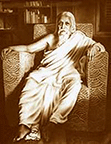Sri Aurobindo
This page was last revised on 8/21/25.
 Concentrate in the heart. Enter into it; go within and deep and far, as far as you can. Gather all the strings of your consciousness that are spread abroad, roll them up and take a plunge and sink down. A fire is burning there, in the deep quietude of the heart. It is the divinity in you – your true being. Hear its voice, follow its dictates.
Concentrate in the heart. Enter into it; go within and deep and far, as far as you can. Gather all the strings of your consciousness that are spread abroad, roll them up and take a plunge and sink down. A fire is burning there, in the deep quietude of the heart. It is the divinity in you – your true being. Hear its voice, follow its dictates.
~ Sri Aurobindo Ghose, Process of Sadhana
In the deep there is a greater deep, in the heights a greater height. Sooner shall man arrive at the borders of infinity than at the fulness of his own being. For that being is infinity, is God — I aspire to infinite force, infinite knowledge, infinite bliss. Can I attain it? Yes, but the nature of infinity is that it has no end. Say not therefore that I attain it. I become it. Only so can man attain God by becoming God.
Infinite, we are free from death; for life then becomes a play of our immortal existence. We are free from weakness; for we are the whole sea enjoying the myriad shock of its waves.
The consciousness of the seer, is a greater power for knowledge than the consciousness of the thinker. The perceptual power of the inner sight is greater and more direct than the perceptual power of thought.
The first and the most important thing is to know that life is one and immortal. Only the forms, countless in number, are transient and brittle. The life everlasting is independent of any form but manifests itself in all forms. Life then does not die… but the forms are dissolved.
The most difficult of all their knots is egoism, the delusion that we have an individual existence sufficient in itself, separate from the universal and only being, ekamevadwitiyam, who is one not only beyond Time, Space and Causality. Not only are we all Brahman in our nature and being, waves of one sea, but we are each of us Brahman in His entirety.
The rooted and fundamental conception of Vedanta is that there exists somewhere, could we but find it, available to experience or self-revelation, if denied to intellectual research, a single truth comprehenshie and universal in the light of which the whole of existence would stand revealed and explained both in its nature and its end. This universal existence, for all its multitude of objects and its diversity of forces, is one in substance and origin; and there is an unknown quantity, X or Brahman to which it can be reduced, for from that it started and in and by that it still exists. This unknown quantity is called Brahman.
~ T H E UPANISHADS TEXTS, TRANSLATIONS AND COMMENTARIES by Sri Aurobindo
THE UPANISHAD first affirms the existence of this profounder, vaster, more puissant consciousness behind our mental being. That, it affirms, is Brahman. Mind, Life, Sense, Speech are not the utter Brahman; they are only inferior modes and external instruments. Brahman-consciousness is our real self and our true existence.
~ The Eternal Beyond the Mind By Sri Aurobindo
To realize Self is to realize the eternal freedom of the spirit. The first realization of the Self as something intensely silent and purely static is not the whole truth of it. There can also be a realization of the Self in its power. Establishing the mind in the Self means the conviction that the self alone is all, and that there is nothing other than it. As ones process deepens, the pervasive sense of coolness and calmness shows that the consciousness is reorienting itself at a deeper level of the being. Joy and happiness not dependent upon outward things begins to manifest. One becomes aware that he is acted through and totally dependent upon the Divine. This realization and accompanying release into peace and happiness is spoken of as liberation and carries with it the value of being released from jail. One begins to feel that the ordinary consciousness is something quite external and on the surface. It does not seem to be ones real self.
~ Sri Aurobindo, The Life Divine
To the rigorous logician bound in his narrow prison of verbal reasoning, the Upanishads seem indeed to base themselves on an initial and fundamental inconsistency. There are a number of passages in these Scriptures which dwell with striking emphasis on the unknowableness of the Absolute Brahman. It is distinctly stated that neither mind nor senses can reach the Brahman and that words return baffied from the attempt to describe It; more -that we do not discern the Absolute and Transcendent in Its reality, nor can we discriminate the right way or perhaps any way of teaching the reality of It to others; and it is even held, that It can only be properly characterised in negative language and that to every challenge for definition the only true answer is neti neti, It is not this, It is not that. Brahman is not definable, not describable, not intellectually knowable. And yet in spite of these passages the Upanishads constantly declare that Brahman is the one true object of knowledge and the whole Scripture is in fact an attempt not perhaps to define, but at least in some sort to characterise and present an idea, and even a detailed idea, of the Brahman.
~ Nature of the Absolute Brahman by Sri Aurobindo
|











































